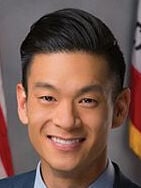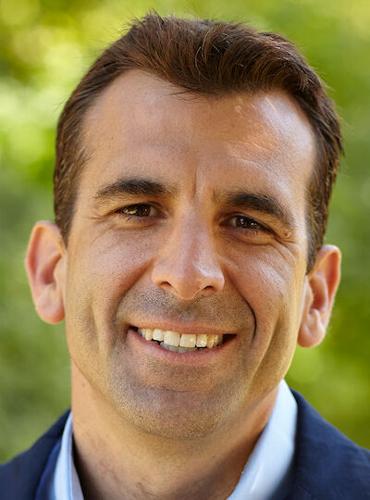Eking out a historically tight primary race may be the easy part for 16th Congressional District candidates Sam Liccardo and Evan Low.
The winner of the seat in the heart of Silicon Valley must navigate representing an industry generally vilified by most of the country, including local residents, while also working closely with the area’s most-influential industry.
Yet despite the all-encompassing influence of high tech in the region, the candidates’ stances on the industry remain somewhat elusive. Liccardo has opinions on a variety of topics, but has only shared his thoughts publicly on cybercurrency. Low has weighed in on the same topic, also on his website like Liccardo, but otherwise has been mum.
With tech under siege from regulators, lawmakers and consumer advocates, where do Liccardo and Low stand on issues like regulatory oversight, privacy and AI’s impact on society, without alienating a powerhouse industry whose employee base and riches are the economic engine of the district?
“Some tech bashing is deserved, but [an all-out condemnation of the industry] is counterproductive to America’s economy and stature,” Liccardo said in a phone interview June 10. “Rather than bashing the industry, we should be bashing Congress” for failing to update data-privacy law for 25 years and not bolstering criminal and civil liability to prevent the worst outcomes of AI, he added.
Nestled near the bottom of his expansive “Let’s Get It Done” plan for the 16th District, Liccardo addresses the Innovation Economy, starting with the need to regulate cybercurrency.
“While Congress has dithered, the crypto industry has exploded — and occasionally imploded — largely without any sensible regulatory framework from Congress,” Liccardo writes. “The $1.7 trillion digital asset genie is now very much out of the bottle, and the clock is ticking.”
But the former mayor of San Jose leaves visitors to his website wanting more, with a tease of new chapters to come, beginning in July. Among them are protecting kids online; immigration and the war for talent; AI; and workforce development and equity.
Liccardo said he would have shared more sooner, but in his door-to-door conversations with voters, most were most interested in reproductive rights and voting rights, he said.
What interest they do have in tech centers on AI and its potential impact on their lives.
“This is very understandable concerns about the size of the companies deeply investing in AI,” he said, acknowledging tech’s hot topic. “This has created barriers to market for startups and innovators.”
Liccardo, who was mayor of San Jose from 2015 to 2023, boasts deep connections to tech: He claims to have had more 200 conversations with tech executives over the years.
Last year, LinkedIn co-founder Reid Hoffman hosted a fundraising event for Liccardo that raised “six figures,” according to Politico. Liccardo raised $1.65 million in the fourth quarter, according to Politico.
“(Tech companies) are a little frustrated folks discovered all these problems (with the Bay Area) and decided that tech should be to blame for all of them,” then-Mayor Liccardo said in an interview in early 2021. “It’s natural for a lot of employers to say ‘We want to go somewhere where people actually want us, and they’re willing to engage with us before they decide to pass the newest regulation or taxes.’”
In an opinion piece in the San Francisco Chronicle, also in 2021, he wrote: “(F)inger-pointing obscures the fact that the Bay Area has become the nation’s most expensive place to build housing, at roughly $700,000 per apartment.”
Low’s publicly disclosed tech policies are also equally thin, though he shared plenty of thoughts in a phone interview June 13.
“Tech was the shining object. It could do no harm; now it is of regulatory concern and consumer protection,” said Low, who grew up in the South Bay. Befitting a local, he thinks first of orchards instead of iPhones when the word apple is mentioned.
“Tech is not solely to blame for societal issues,” he continued. “Part of the government’s responsibility is to support its long-term growth while mitigating its negative impact on housing, the cost of living and impact on infrastructure.”
As a California assemblymember, Low has voted for and supported the state’s groundbreaking privacy laws, CCPA and CPRA, which have become models for the rest of the nation. But he’s less optimistic about federal law until Congress learns the “basic essentials” of tech.
He’s keenly focused on AI and its major implications on the work force, though it has yet to resonate with voters unless they are directly impacted. Indeed, tech is not a top-10 issue among the voters with who he’s interacted. For now, they’re more concerned with global conflicts, housing, climate change, the cost of living and jobs, Low said.
On his website, Low lists technology as one of eight priorities, citing his tenure as founder and chair of the California Legislative Technology and Innovation Caucus.
“In Congress, I will promote a Silicon Valley ‘Acceleration Agenda’ advocating on market-forward policies that advance emerging technologies including digital currency and artificial intelligence, and supporting a growth-focused tax system,” Low writes.
Low places particular emphasis on blockchain.
“I will work to make sure that innovation in crypto and digital assets can continue to create well-paying jobs in our district,” he said. “But the status quo securities laws from 1933 are not fit to regulate 21st century technologies. It’s time for clear rules of the world. If Congress does not act, more and more Americans will be exposed to the risks of offshore and unregulated entities like FTX.”
Of course, tech policies are plentiful in Congress; the rub is that no significant legislation has been passed in two decades as companies grow in economic power and cultural stature.
Indeed, the Bay Area’s congressional delegation has been conspicuously mum despite antitrust investigations by the Department of Justice and Federal Trade Commission to rein in tech’s biggest players, including local giants Apple Inc., Alphabet Inc.’s Google, and Facebook parent Meta Platforms Inc.
Their reluctance highlights the risks of taking on an industry whose profile in the region is staggering. The number of tech employees in the region (more than 400,000, or 11.6% of the Bay Area workforce, according to CBRE), their considerable economic power (in the form of donations and voting blocs), and lobbying efforts in the nation’s capital make tech an extremely powerful force.
“Some members of Congress have been politicizing tech in unhealthy ways. It is intellectually dishonest,” Liccardo said. “Lack of regulation is not the fault of tech. Tech leaders like [Meta CEO] Mark Zuckerberg want modest legislation.”
“We have to find a way to get there,” he added.

































(0) comments
Welcome to the discussion.
Log In
Keep the discussion civilized. Absolutely NO personal attacks or insults directed toward writers, nor others who make comments.
Keep it clean. Please avoid obscene, vulgar, lewd, racist or sexually-oriented language.
Don't threaten. Threats of harming another person will not be tolerated.
Be truthful. Don't knowingly lie about anyone or anything.
Be proactive. Use the 'Report' link on each comment to let us know of abusive posts.
PLEASE TURN OFF YOUR CAPS LOCK.
Anyone violating these rules will be issued a warning. After the warning, comment privileges can be revoked.